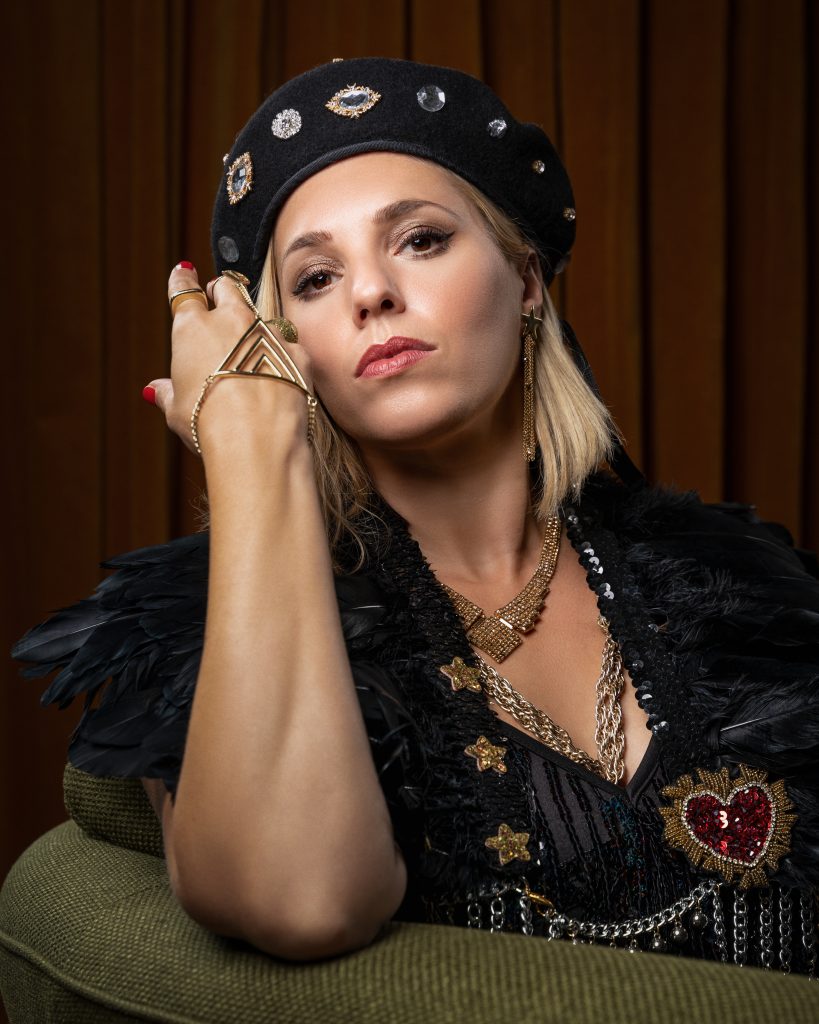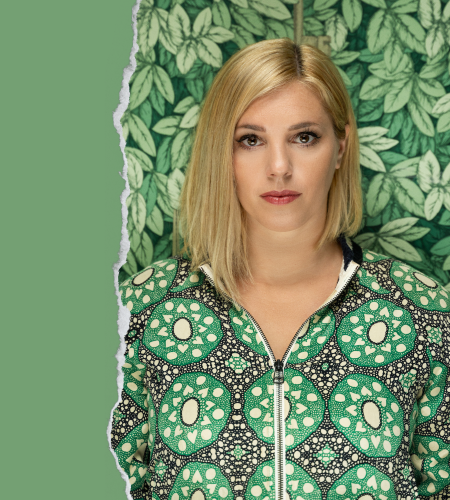
Scottish collective Hen Hoose are on a vital mission to give the music industry a long overdue shake-up.
In 2020, Scottish musician Tamara Schlesinger took action to tackle the gender gap in the music industry. She founded Hen Hoose, a collective of female and non-binary artists, writers, and producers. Together, they’re creating a space where collaboration thrives, and new music is born.
The group is made up of talented individuals from all over the UK and Europe. Many of them have worked on big projects, from Hollywood films to Netflix shows, and even global advertising campaigns. They’ve also written for theatre productions, all while pursuing successful careers as artists in their own right. But Hen Hoose gives them a chance to come together, pooling their skills and creativity across genres.
Their work hasn’t gone unnoticed. In 2022, The Big Issue highlighted Hen Hoose as one of their Cultural Changemakers for their work in promoting gender equality. That same year, the collective received support from the John Lennon Foundation, allowing them to expand beyond Scotland for the first time. By 2023, further backing from PRS for Music enabled them to launch a mentoring program, helping emerging talent across the UK.
At its heart, Hen Hoose is about more than music – it’s about reshaping the industry. Through collaboration and support, they’re making it a fairer place for everyone involved.
We caught up with Tamara to reflect on Hen Hoose’s first EP, the impact Hen Hoose is making on the music scene, as well as addressing gender biases and contributing to the visibility of women and non-binary artists.
SheBOPS: Can you describe the creative process behind Hen Hoose – EP 1?
Tamara Schlesinger: The EP was part of a collaborative songwriting project which saw artists come together (mainly remotely) to work on a track together. This EP is the first of three that we are releasing this year. Each pair was given three different briefs to choose from and this was a jumping off point, to offer various themes and genres to work within. Each pair had never worked together before and the idea was to pull artists out of their comfort zones and to collaborate across genres that they would not normally work within. Each pair either produced or co-produced the tracks.
The collective’s debut EP showcases diverse talent. How did you ensure each voice was authentically represented?
It was important for me to have a diverse and wide variety of artists across as many genres as possible, as I wanted to try and have a broad collection of songs that felt honest and real.It was so important that the pairs were comfortable working together. While there were briefs to write to, they were not restrictive, more a place to begin. Every song took on the identity of the artists involved. That is all down to the safe and open environment that was created and the flexibility within the groups.
Hen Hoose is paving the way for female and non-binary artists. What drives your passion for this mission?
I have released my own music and run my own record label for years now, but the industry has always felt pretty exclusive and secretive and especially hard as a female artist. There are less opportunities, less festival slots, less radio play, the list goes on really. I have felt a real desire to try to implement change, not just to create opportunities for others, but to also show the pathways into the industry, not to hold all those secrets close to my chest, but to make it more inclusive and accessible for female and non-binary artists and record producers.
How do you see Hen Hoose’s approach to collaboration influencing the broader music industry?
I would like to think that it will make a more open landscape and make others consider broadening their own focus. Inevitably you learn a huge amount by collaborating – even if you are really established. So, it would be great to see more opportunities opening up for collaborations. I think you often have songwriting groups behind a major label artist, but they are often hidden behind the scenes. We are trying to make the writers front and centre to allow them to gain more recognition.
How does Hen Hoose support its artists beyond the music-making process?
Hen Hoose works on various projects beyond the creation of music. We run songwriting camps, audio production courses, workshops, panels and events and we are also launching a new mentoring programme. All of the educational opportunities are available for free and we try to make everything as accessible as possible.
What role does Glasgow play in the identity of Hen Hoose?
Glasgow has a brilliant music scene which is small enough to know everyone, but varied enough to have some incredibly exciting music and diverse talent. So, I think Glasgow plays a big part in the identity of Hen Hoose. The name itself ‘hen’ is Scots for woman. But we do not work exclusively in Glasgow, we try to offer opportunities as widely as possible across Scotland, remotely if needed.
How do you feel Hen Hoose is contributing to the visibility of women and non-binary artists in the music scene?
I think Hen Hoose has made a huge impact on the music scene in Scotland, I would like to think that we are starting to have a bigger impact beyond Scotland now too. By highlighting the talent that we have, the gender disparity that exists in the music scene and by getting press and radio coverage for the organisation, releases and collective members, I think we are doing a huge amount to contribute to the visibility of women and non-binary artists. We are proud of what we have achieved so far.
How do you see the music industry evolving to better support women and non-binary artists?
I think there are baby steps happening, I definitely see a conscious move to create a more equal landscape. We are working with some major labels now, and I know that they are also trying to create more opportunities for women and non-binary artists. But there is a lot of work to do. Just creating a space for women is not enough, it needs to be a shift from the top down. There needs to be a change either to the gatekeepers or a want to create change from the gatekeepers, not just a box ticking exercise.
How does Hen Hoose address and combat gender biases in the music industry?
We address gender biases through the work we do. We create more opportunities and aim to shift the landscape. But more importantly, we aim to educate female and non-binary artists about all the options that they have for a career in the music industry, not just as musicians, but in technical roles such as sound engineers and record producers. Roles that are so often not filled by female and non binary people.
What are some of the biggest misconceptions about female and non-binary artists that Hen Hoose aims to dispel?
I would say that the biggest misconception is that women can’t do technical roles. Or they are certainly not expected to be doing them. I think people often expect a man to be behind the production of the track. I also think that there are still certain roles that tend to be led by men, such as drummers in bands, or record producers. I hope by creating our live shows which are a full 360 of female and non-binary musicians and technicians and by creating albums and EPs that are written, produced, mixed and mastered by female and non binary people, that we are showing just how wrong that idea is.
What advice would you give to young female and non-binary artists aspiring to join the music industry?
I would say believe in yourself, discover your sound and learn the skills yourself, do as much as you can by yourself to have as much control as you can. And then find like minded people to work with, that can help you to create the sound that you want. Come along to events and panels such as the Hen Hoose ‘flock sessions’, meet other artists and be part of a community.
What are some of the biggest challenges Hen Hoose has faced and overcome?
I think we have been fairly lucky with the support that we have received so far, the main issue for us is funding. We have funding for 2 years to complete our work, but after that we will have to look at alternative funding sources. We want to continue to offer everything for free so that we are inclusive, so that means we need to gather funds from somewhere to continue running as an organisation.
What are some key lessons you’ve learned from the journey of Hen Hoose so far?
I think the key lesson I have learnt from founding Hen Hoose is the need for something like us to exist. The joy of creating opportunities and building a community and the ability to just go out there and ask. Not to be afraid of approaching someone that seems unapproachable, to ask if they want to be a part of the collective or a part of our journey as a partnering organisation.
What are your hopes for the legacy of Hen Hoose and the forthcoming trilogy of EPs?
I hope that one day we don’t have to exist, and that we will be seen as the organisation that has made way for a very different landscape in the music industry in Scotland and beyond. I hope that the EP’s garner the acclaim that they deserve and highlight some new artists that not everyone will have heard of yet. We will have more music coming out after these recordings too, so it is exciting to constantly have new material to share and new artists to promote.
Hen Hoose, EP 1 and EP 2 are out now.


